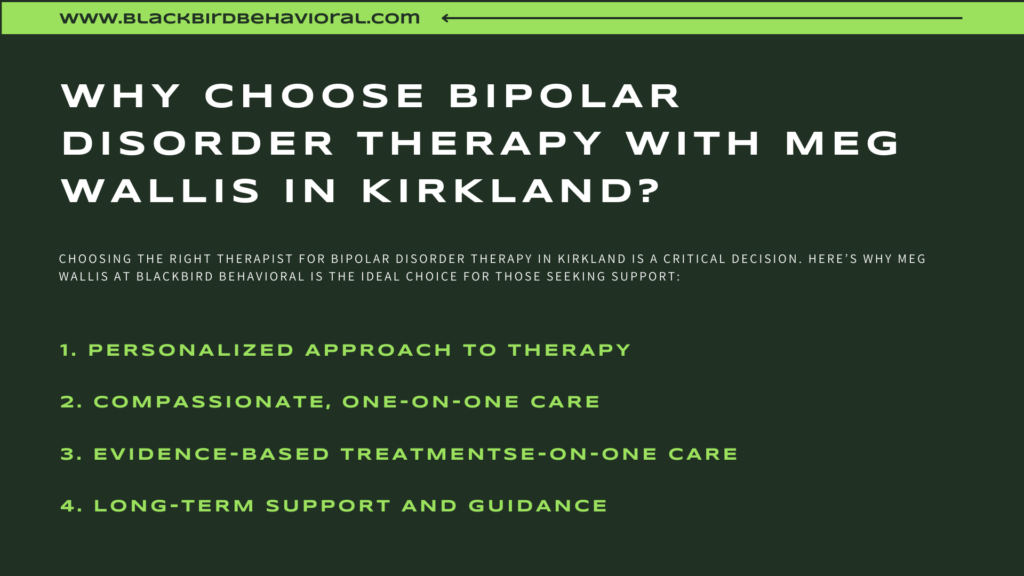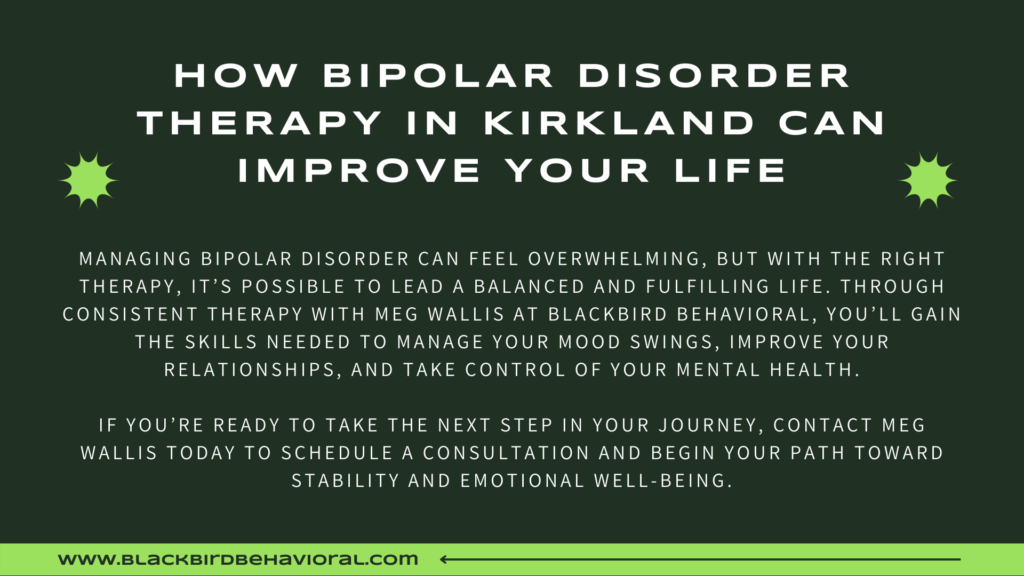Introduction to Bipolar Disorder Therapy in Kirkland
Bipolar disorder is a complex mental health condition that affects millions of people worldwide. It’s characterized by intense mood swings, fluctuating from manic highs to depressive lows, which can significantly impact daily life, relationships, and overall well-being. While living with bipolar disorder can be overwhelming, professional therapy offers a pathway to emotional stability and improved quality of life.
At Blackbird Behavioral Health in Kirkland, Meg Wallis, a dedicated and experienced therapist, offers personalized bipolar disorder therapy designed to meet each individual’s unique needs. Meg’s approach is grounded in evidence-based therapies that help clients manage their mood swings, develop coping strategies, and find balance in their lives.

Understanding Bipolar Disorder
Bipolar disorder, once known as manic depression, is a mental illness that causes extreme mood changes. These changes can range from manic or hypomanic episodes, where a person feels euphoric, overly energetic, or irritable, to depressive episodes, where they feel sad, hopeless, or lethargic. The severity and frequency of these episodes can vary from person to person.
Types of Bipolar Disorder
There are several types of bipolar disorder, each presenting its own challenges:
- Bipolar I Disorder: This type is characterized by at least one manic episode that lasts for at least seven days or by severe manic symptoms that require hospitalization. Depressive episodes often follow the manic phase.
- Bipolar II Disorder: Individuals with bipolar II experience a pattern of depressive episodes and hypomanic episodes, which are less severe than full mania.
- Cyclothymic Disorder: This milder form of bipolar disorder involves periods of hypomanic and depressive symptoms that last for at least two years (or one year in children and adolescents), but do not meet the diagnostic requirements for a hypomanic or depressive episode.
- Other Types: Some individuals may experience bipolar symptoms that don’t fit neatly into these categories, often referred to as unspecified or mixed episodes, where symptoms of both mania and depression are present.
Bipolar disorder can disrupt relationships, work, and daily functioning, making it essential to seek professional therapy for proper management. Learn more about the symptoms of bipolar disorder.

Signs and Symptoms of Bipolar Disorder
Recognizing the signs and symptoms of bipolar disorder is a critical first step in seeking therapy. The disorder is marked by manic, hypomanic, and depressive episodes. Here’s what to look for in each phase:
Manic and Hypomanic Episodes:
- Increased energy, activity, or restlessness
- Elevated, euphoric, or irritable mood
- Decreased need for sleep
- Racing thoughts or rapid speech
- Impulsivity, engaging in risky behaviors (e.g., excessive spending, reckless driving)
- Overconfidence in abilities, feeling invincible
- Distractibility or inability to concentrate
Depressive Episodes:
- Persistent sadness, hopelessness, or emptiness
- Loss of interest in activities once enjoyed
- Fatigue or low energy, even with adequate sleep
- Difficulty concentrating or making decisions
- Significant changes in appetite or weight
- Feelings of worthlessness or guilt
- Suicidal thoughts or behaviors
These mood swings can be disruptive and unpredictable, but bipolar disorder therapy in Kirkland with Meg Wallis focuses on managing these episodes and restoring emotional balance. Learn more about managing bipolar disorder symptoms.

How Bipolar Disorder Therapy Works
Therapy for bipolar disorder focuses on helping individuals manage mood fluctuations, reduce the severity of episodes, and improve overall functioning. At Blackbird Behavioral, Meg Wallis provides a range of therapeutic approaches tailored to the unique needs of each client. The goal is not only to treat symptoms but to empower individuals with the tools to live a balanced and fulfilling life.
Cognitive-Behavioral Therapy (CBT) for Bipolar Disorder
Cognitive-Behavioral Therapy (CBT) is one of the most effective treatments for bipolar disorder. CBT focuses on identifying and challenging negative thought patterns and behaviors that contribute to mood swings. By learning to reframe these thoughts, individuals can prevent extreme shifts in mood and develop healthier emotional responses.
In therapy, Meg works closely with clients to:
- Identify triggers for manic or depressive episodes
- Challenge irrational or distorted thoughts
- Develop problem-solving skills to cope with stress
- Establish a stable daily routine to promote emotional balance
CBT has been shown to help individuals with bipolar disorder reduce the frequency and intensity of mood swings. Explore the benefits of CBT for bipolar disorder.
Dialectical Behavior Therapy (DBT) for Emotional Regulation
For individuals who struggle with intense mood swings, Dialectical Behavior Therapy (DBT) can be a highly effective approach. Originally developed to treat borderline personality disorder, DBT is now widely used to help those with bipolar disorder manage emotional dysregulation.
DBT teaches clients how to:
- Practice mindfulness to stay grounded in the present moment
- Regulate intense emotions before they lead to extreme highs or lows
- Develop distress tolerance to cope with crisis situations in healthier ways
- Improve interpersonal relationships through better communication skills
By combining CBT techniques with mindfulness practices, DBT empowers clients to manage their emotions and avoid impulsive behaviors that can exacerbate mood swings. Learn more about DBT techniques.
Psychoeducation and Lifestyle Changes
Therapy for bipolar disorder also involves educating individuals about their condition and helping them make lifestyle changes that promote stability. Psychoeducation is a crucial part of therapy, as it helps clients understand the nature of their disorder, recognize early warning signs of mood shifts, and take proactive steps to prevent relapses.
Some lifestyle changes that can support therapy include:
- Maintaining a regular sleep schedule to regulate mood
- Engaging in regular physical activity to improve mental and physical well-being
- Developing a healthy diet to stabilize energy levels and mood
- Avoiding alcohol and recreational drugs, which can trigger mood episodes
- Tracking mood changes to identify patterns and triggers
At Blackbird Behavioral, Meg Wallis integrates psychoeducation into her therapy sessions, ensuring that clients are equipped with the knowledge and tools to manage their bipolar disorder effectively.

The Role of Medication in Bipolar Disorder Treatment
While therapy is crucial for managing bipolar disorder, medication often plays an essential role in stabilizing mood swings. Mood stabilizers, antipsychotics, and antidepressants are commonly prescribed to help control manic and depressive episodes. However, medication is not a one-size-fits-all solution, and it’s important for individuals to work with their healthcare provider to find the right balance.
Meg Wallis collaborates with medical professionals to ensure a holistic treatment approach, where therapy and medication work together to achieve the best outcomes for the client.

Why Choose Bipolar Disorder Therapy with Meg Wallis in Kirkland?
Choosing the right therapist for bipolar disorder therapy in Kirkland is a critical decision. Here’s why Meg Wallis at Blackbird Behavioral is the ideal choice for those seeking support:
1. Personalized Approach to Therapy
Meg understands that no two individuals experience bipolar disorder the same way. That’s why she offers a personalized approach, tailoring each therapy plan to address the unique challenges and goals of her clients. Whether you’re dealing with frequent mood swings, depressive episodes, or manic behaviors, Meg will create a therapy plan designed specifically for you. Learn more about personalized therapy options.
2. Compassionate, One-on-One Care
At Blackbird Behavioral, you’ll receive focused, individualized care from a therapist who is deeply committed to your well-being. Meg’s compassionate approach creates a safe, non-judgmental environment where you can feel comfortable sharing your experiences and working through your challenges.
3. Evidence-Based Treatments
Meg utilizes proven, evidence-based therapies like CBT and DBT, ensuring that you receive the most effective treatment for managing bipolar disorder. These therapies have been shown to help individuals reduce the intensity of mood swings and improve emotional regulation. Explore more about evidence-based therapy.
4. Long-Term Support and Guidance
Bipolar disorder is a lifelong condition that requires ongoing management. Meg is dedicated to providing long-term support, helping you navigate the ups and downs of living with bipolar disorder. With her guidance, you’ll learn to recognize warning signs, manage your mood shifts, and achieve greater emotional stability.
Frequently Asked Questions About Bipolar Disorder Therapy in Kirkland
1. How long does bipolar disorder therapy typically last?
The duration of therapy varies from person to person. Some individuals may see significant improvements in a few months, while others may benefit from longer-term therapy to manage their symptoms effectively. Ongoing support is often needed to maintain stability.
2. Can bipolar disorder be treated without medication?
While therapy is crucial for managing bipolar disorder, many individuals benefit from a combination of medication and therapy. Medication helps stabilize mood swings, while therapy provides coping strategies and emotional regulation tools.
3. What should I expect during my first therapy session?
During your first session with Meg Wallis, you’ll discuss your symptoms, medical history, and personal goals for therapy. This initial consultation helps Meg develop a personalized treatment plan tailored to your needs.

How Bipolar Disorder Therapy in Kirkland Can Improve Your Life
Managing bipolar disorder can feel overwhelming, but with the right therapy, it’s possible to lead a balanced and fulfilling life. Through consistent therapy with Meg Wallis at Blackbird Behavioral, you’ll gain the skills needed to manage your mood swings, improve your relationships, and take control of your mental health.
If you’re ready to take the next step in your journey, contact Meg Wallis today to schedule a consultation and begin your path toward stability and emotional well-being.






